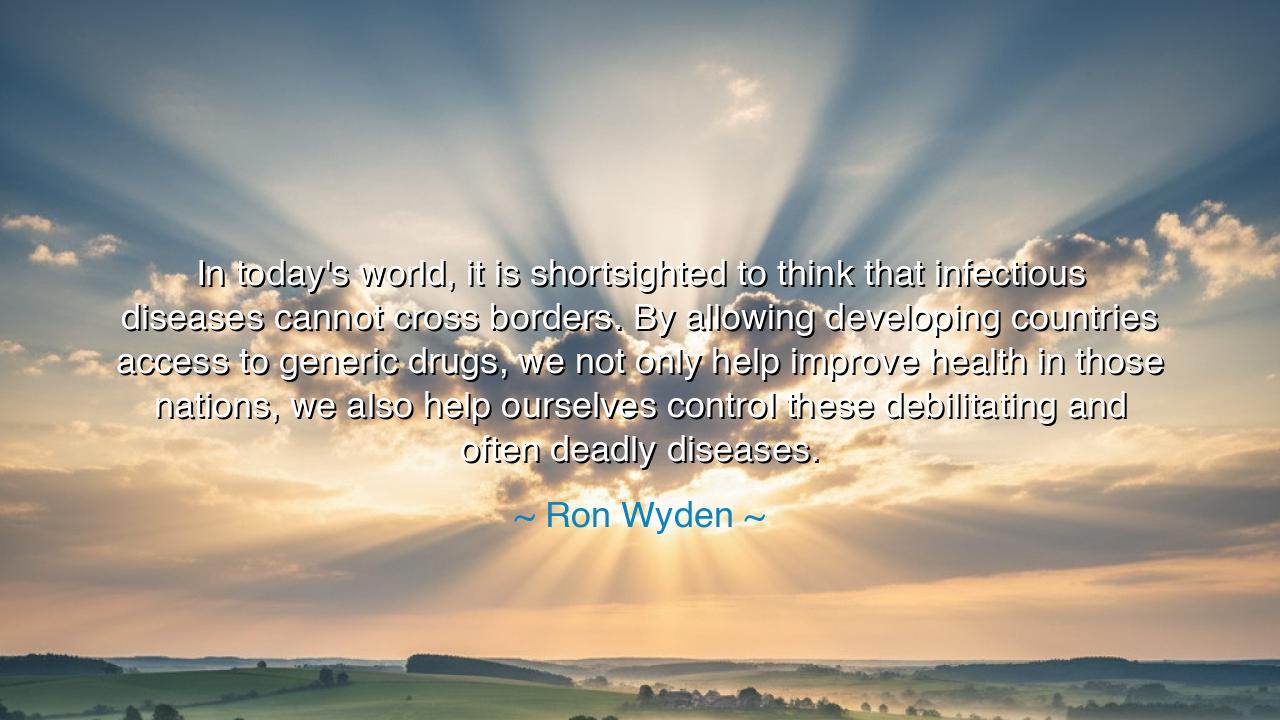
In today's world, it is shortsighted to think that infectious
In today's world, it is shortsighted to think that infectious diseases cannot cross borders. By allowing developing countries access to generic drugs, we not only help improve health in those nations, we also help ourselves control these debilitating and often deadly diseases.






In the wise and far-seeing words of Ron Wyden, a servant of the people and a guardian of justice, we hear a truth that speaks to both the mind and the heart: “In today’s world, it is shortsighted to think that infectious diseases cannot cross borders. By allowing developing countries access to generic drugs, we not only help improve health in those nations, we also help ourselves control these debilitating and often deadly diseases.” These are not the words of mere politics — they are the voice of reason tempered by compassion, the call of one who understands that the health of humanity is indivisible. In an age when the world is bound by trade, travel, and technology, Wyden reminds us that illness knows no nation, no color, no creed. To heal one is to heal all; to neglect one is to endanger all.
Ron Wyden, a United States senator and advocate for healthcare reform, spoke these words in defense of justice in medicine. He recognized the growing inequality between nations — a divide not of will, but of access. In the wealthier corners of the world, medicines are plentiful and innovation thrives; yet in vast stretches of the globe, the poor suffer and die for want of a cure that already exists. His words are rooted in the moral truth that compassion and practicality are not opposites but allies. By granting developing nations the right to generic drugs, Wyden called upon the world to act not only with generosity, but with wisdom — for the diseases that fester in one part of the world soon find their way to another. The web of life binds us all; if one thread frays, the whole tapestry is weakened.
There is an ancient wisdom mirrored in his insight. The Greeks taught that hubris, or pride, blinds men to their interdependence. The same lesson echoes here: when the powerful ignore the suffering of the weak, they sow the seeds of their own peril. The plagues of history — from the Black Death that swept through Europe, to the influenza of 1918, to the pandemics of our own time — have shown that borders are no shield against nature. The wind carries spores, the traveler carries disease, and the careless spirit carries ruin. Thus Wyden’s words serve as a moral compass: solidarity is not charity; it is survival.
Consider the story of the HIV/AIDS crisis in the late twentieth century. In those years, millions perished in Africa and Asia while treatments existed elsewhere — locked behind the high walls of patent and profit. When generic drugs were finally produced and distributed widely, the death toll began to fall, and entire nations were brought back from the brink of despair. This victory was not only moral but practical: by reducing infection rates abroad, the world reduced the threat at home. Disease, like fire, must be extinguished wherever it burns; to let it rage in one corner is to risk a conflagration that consumes all.
Wyden’s teaching, then, is not only about medicine — it is about vision. To be “shortsighted,” as he warns, is to live in the illusion of isolation. The modern world, with its ships and planes, its trade and migration, is a single organism — vast, complex, and vulnerable. The virus that infects one limb can destroy the whole body. To invest in the health of others is to invest in the stability of the entire world. In this way, health becomes the truest form of diplomacy, a bridge between nations that transcends politics.
Yet there is a deeper spiritual truth beneath his words: that generosity is the highest form of wisdom. The one who shares his medicine not only heals the sick, but purifies his own heart. When we extend help beyond our borders, we affirm the sacred unity of humankind. Every act of compassion ripples outward, strengthening the bonds of peace. Every act of greed or indifference poisons those same waters. As the ancients said, “He who would preserve himself must serve the whole.”
Let this, then, be the lesson carried forward: do not live as if your neighbor’s suffering is not your own. When you see illness, fight it; when you see need, answer it. Support the causes that extend medicine to the poor, the laws that balance innovation with access, the leaders who see beyond profit to purpose. In your own life, remember that the strength of any community — from a village to a world — is measured by how it treats its weakest members.
And so, my children of the future, take these words of Ron Wyden to heart. Do not be shortsighted. Look beyond your own walls, your own comfort, your own country. For the health of the world is the health of the soul — and when one person, one people, one nation rises to heal another, the entire human family takes a step toward light. In the balance of compassion and foresight lies the true art of civilization: the understanding that by saving others, we save ourselves.






AAdministratorAdministrator
Welcome, honored guests. Please leave a comment, we will respond soon